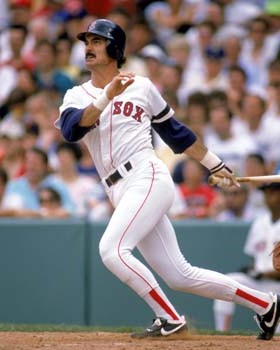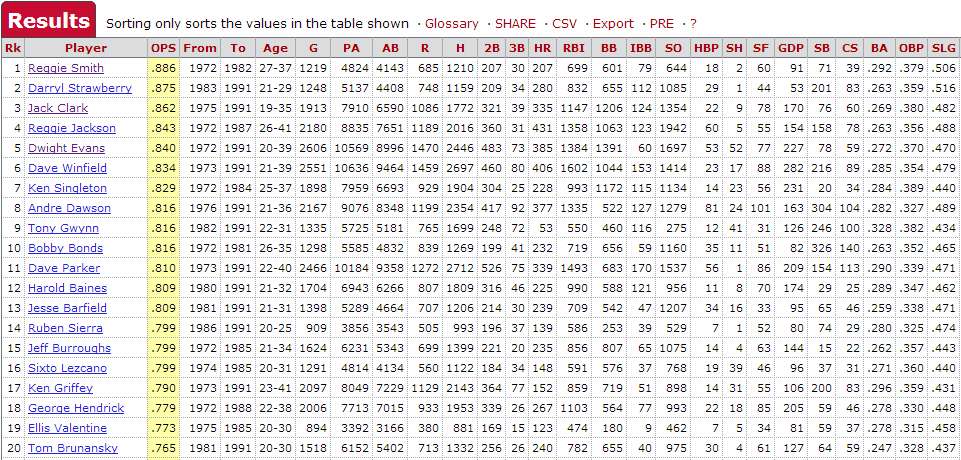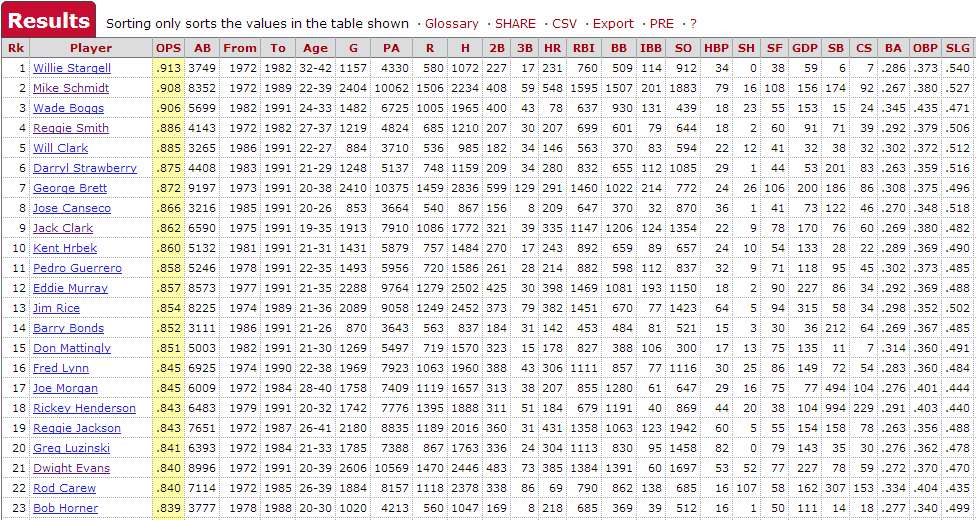Dwight Evans, right fielder
Dwight Michael Evans
Boston Red Sox (1972-1990)
Baltimore Orioles (1991)


Dwight Evans is one of the stronger candidates from the pool of those players not already in Cooperstown. In fact, when I look at the 3.6% he got the last time he appeared on the ballot, in 1999, I am puzzled. Yes, the competition in 1999 was stiff, as three players were voted in-Nolan Ryan, George Brett and Robin Yount. And six other players on that ballot were eventually voted in by the BBWAA, as well. But surely Evans deserved to remain on the ballot at the very least, didn't he? How does a player with his credentials fail to garner the 5% required to remain on the ballot for future consideration?
Dwight's career numbers are listed above. They are impressive, especially when you consider the era he played in. So why was there so little support for one of Boston's favorite players?
Before we continue, a few things should be said. One, the advanced metrics used by today's statisticians were not available to the Baseball Writers in 1999. When considering why Dwight Evans fell off the ballot, we would need to consider his worthiness using the same evaluation methods the writers did some fifteen years ago. But to do so would simply be rehashing what has already been done. What we are seeking to do here is make a case for his induction based off of things that the writers might not have seen.
In order to proceed with this discussion, and accurately determine if Evans is worthy, I should share my methodology. I have alluded to some things in the past, but I have not done a good job of stating in detail how I look at a player.
Before I can start considering Dwight Evans' relevance from a historical context, the first thing I do is compare him against his peers. Specifically, I look at a player's primary position during their career, and compare the subject against the others playing that same position at the same time. Dwight Evans played in 2,606 games in his twenty season career. Of those, the vast majority was spent in right field, where he played 2,092 games. Evans played from 1972 to 1991. Now, Evans merits consideration for the Hall based on his career statistics alone. But his candidacy would be strengthened if it could be shown that he was one of the very best at his particular position during his career. We are doing this because we do not know how deep the position was during his career.
So, let's consider the right fielders in Evans' day. In order to get a large enough sample of players, I lower the game requirements to 750 games played. This isn't a perfect method, of course. I might be getting the early years of a player's career before they have hit their prime, meaning their numbers comparatively might be lower. I may also be catching the end of a player's career. But, if I raise the games played requirement, then more players will be excluded. So, I compromise.
A total of 26 Major Leaguers played at least 750 games in right field during Evans' career. How did Evans compare against his peers from an offensive standpoint? The one metric I come back to more than any other is OPS. It is not a perfect measurement, but it is a metric that can easily be understood, and it combines two primary elements of offense-getting on base, and hitting for power. A truly dynamic player will hit for power and get on base at a high rate. A high OPS means that the hitter provides value to an offense in multiple ways.
Of those 26 players, Evans ranked 5th in OPS, behind Reggie Smith, Darryl Strawberry, Jack Clark and Reggie Jackson. When you look at some of the players who are listed behind Evans, his numbers look even better. Among them are three Hall of Famers: Dave Winfield, Tony Gwynn and Andre Dawson.

Anytime you beat out hitters of those caliber, you have strengthened your own position. Now, keep in mind, as it has astutely been pointed out to me in the past, OPS does not take several things into consideration, like base stealing, or defense. Dwight Evans was a power hitter, and a run producer. He was not a base stealer by any means. And many of the players on this list provided value to their team by stealing bases. Three stole over 300 bases in their career: Bobby Bonds, Claudell Washington and Andre Dawson. Tony Gwynn stole 246, and early in his career, he was a real base stealing threat, tallying 56 thefts in 1987, and 40 in 1989. Gwynn was also awarded 5 Gold Glove Awards for his defensive play in right field. Andre Dawson won 8 Gold Gloves. But here, too, Dwight Evans provides great value defensively. Evans won 8 Gold Gloves of his own. As Red Sox fans can attest, and as my research showed, Evans had one of the strongest throwing arms in the game. While the number or extra bases he saved with his arm cannot be quantified, it is worth mentioning that his defense was a great asset to the Red Sox, and it elevated his standing among the greats of the game that played during Evans' career.
Now, we compare Evans against the very best hitters during his era. This is where Dwight Evans will either shine, or fall short.
I mentioned before that Evans was a power hitter. While he only won one home run title in his career, in the strike-shortened 1981 season, hitting 375 home runs in any era is impressive. Again, it is important to consider the era that Evans played in. While Evans was a decent power hitter early in his career, he really found his power stroke as he approached age 30. He hit 22 to lead the American League in '81 as a 29 year old. Between 1982 and 1987, a six year span, he hit 175 home runs, an average of 29 per season, or 31 per 162 games played. In fact, his 162 game average over this 6 year span were outstanding: 111 runs, 34 doubles, 5 triples, 31 home runs and 99 RBI.
That's 70 extra base hits per 162 games played for a six year period, all while over 30 years of age.
The argument might be made that Evans benefited from playing his home games at Fenway Park. Evans, a right handed hitter, had the Green Monster in left. While it does appear that the Green Monster helped him accumulate more doubles at home (he hit 279 doubles at home, and 204 on the road), his home and road splits are very close when it comes to home runs. Evans hit only 21 more home runs at home than he did on the road (203 vs 182). If anything, it seems that Evans' power was fairly consistent regardless of where he played.
Before we compare Evans against the very best hitters from his era, some context is needed. Between the years 1972 and 1991, the entirety of Dwight Evans' career, there were a total of 29 40 home run seasons in the Major Leagues, including only 2 seasons of 50 or more home runs (George Foster's 52 in 1977, and Cecil Fielder's 51 in 1990). Between 1995 and 2014, the last twenty seasons, there have been 158 40 home run seasons, including 25 of 50 or more, 6 of 60 or more, and 2 seasons of 70 or more home runs (Mark McGwire hit 70 in 1998, and Barry Bonds hit 73 in 2001).
Baseball Reference.com, 40 home run seasons in the Major Leagues between the years 1972 and 1991.
Baseball Reference.com, 40 home run seasons in the Major Leagues between the years 1995 and 2014.
Let's now examine the very best hitters from Evans' era.
During Evans' career, there were 183 individual seasons where hitters with over 400 at bats reached a .900 OPS. Four of those seasons belonged to Evans, and as previously mentioned, he led the American League twice. Of those one 183 individual seasons, only 17 of them reached a 1.000 or better OPS. Comparatively, there were a whopping 545 individual seasons of .900 or higher OPS between 1995 and 2014, and 138 reached a level of 1.000 or higher.
It was a different game when Dwight Evans played. Numbers today are inflated. When Dwight Evans played, getting 385 home runs meant something. Look at it this way. By the time Dwight Evans had retired in 1992, many of the game's all-time greatest power hitters had gone before him. Aaron, Ruth, Mays, Mantle, Robinson, Killebrew. Their spectacular home run totals were etched in the annals of baseball history. But at his retirement, only 29 other men had ever hit more than Dwight Evans' 385 round-trippers. But going back to OPS again, how did he do against his peers. Not only the right fielders, but everybody in the game.
Between 1972 and 1991, there were 306 hitters to tally 3,000 or more at bats. Of those, only 20 hitters could top the .840 put up by Dwight Evans. Of those, 9 are Hall of Famers.

How about comparing Evans against his peers for the decade of the 1980s, which would represent the prime of his career, from age 28 to 37?
In the 80s, 140 hitters totaled 3,000 or more at bats. Dwight Evans, from that group, had the sixth best OPS in the Majors. Only Mike Schmidt, Wade Boggs, George Brett, Don Mattingly, and Pedro Guerrero were better in the 80s. He was better than Darryl Strawberry and Eddie Murray, Dale Murphy and Robin Yount. In fact, if you look at the Hall of Famers who played in that decade, he beat 16 of 'em.
In fact, if you look at the beginning of the live ball era, 1920, until the end of his career in 1992, his .840 OPS ranks 72nd. The man ahead of him on the list? Carl Yastrzemski at .843. The five men behind him on this list? Greg Luzinski, Don Mattingly, Dave Winfield, Roberto Clemente and Enos Slaughter.
Baseball Reference.com list of all-time highest OPS from 1920 to 1992.
Evans was top tier offensive force. Was he an
elite power hitter? No. The 70s and 80s only truly had two elite power hitters, Mike Schmidt and Reggie Jackson. However, when you combine everything that Evans brought to the table, though, the 941 extra bases, the runs production, his 1,391 walks, he could do everything you'd want a right fielder to do offensively. He had power, and he had a high on base percentage. He wasn't fast, but defensively he made up for his average speed with a tremendously strong and accurate arm. Sounds to me like the prototypical right fielder.
Evans had the seventh most home runs in the 70s and 80s. And when you look at the men who had more home runs than him, which of those would you rather have batting fourth or fifth in your lineup? Schmidt and Jackson again, absolutely. Forgetting for just a minute Mike Schmidt's spectacular defensive abilities, he was the home run threat for the entirety of his career. Reggie was comparable, but his OPS was some 63 points lower. The next two men, Darrell Evans and Dave Kingman, brought the home run, and not much else. Kingman managed a paltry 608 walks in nearly 2,000 games. His .302 OBP was just terrible. Evans? Considering his .248 AVG, he had an outstanding OBP of .361, having walked some 1,600 times. Next is Jim Rice, a man who is in the Hall of Fame. I've felt for some time that Evans, not Rice, was the most complete Red Sox outfielder of the trio that started in the 70s (the other being Fred Lynn). My research of the net found
this interesting analysis and discussion of just that. A comparison of RAA (runs above average) shows that Evans was not only better, but much better than Rice when all things are considered. Rice was a great hitter, and I am not disputing that. He had a three year run between 1977 and 1979 that would hold up well against many of the game's greatest sluggers. He hit .320 with a .972 OPS across those three seasons, totaling 620 hits, 124 home runs and 384 RBI. He won an MVP (1978), and finished 4th and 5th in the MVP vote the other two seasons. 1983 saw a return to form for Rice, who hit .305 with a .911 OPS, leading the AL with 39 home runs and 126 RBI. He had other very good seasons, too. In 1975, he was second in the Rookie of the Year Vote, and 3rd in the AL MVP (teammate and fellow rookie Fred Lynn won both) hitting .309 with 22 homers and 102 RBI. In 1986, he hit .324 and again topped 200 hits and 100 RBI. But Dwight Evans was a more complete package. He lacked some of the highs Rice achieved (never winning an MVP), but he was steady. And he had that presence in right field. You didn't run on him. But after reading the excellent article written by adarowski back in 2010, when some of the pomp is stripped away, Evans was really better. Of the three outfielders that made up what was arguably the best outfield of the 70s, the Hall of Famer might have been the low man on the totem poll.
Rice went to 8 All Star Games. Lynn 9. Evans went to only three. If he were elected, he would tie Robin Yount for fewest All Star Game appearances by a Hall of Famer in the All Star Game era. It seems that Evans did not get the recognition from fans when he played. He was third in the AL MVP race in 1981, that strike shortened season. He finished in the top 5 one other time. Again, under-appreciated could have been Evans' middle name.
When everything is considered, I could definitely see Evans as a Hall of Famer. Certainly not on the level of the immortals like Ruth, Aaron or Mays. But a second tier Hall of Famer? Absolutely. Evans has fallen victim to writers who have underappreciated him. History, for example, will remember Carlton Fisk's iconic Game 6 winning home run from the 1975 World Series. But rather unfairly, it seems to forget the spectacular catch and throw double play Dwight Evans made to close the Reds out in the top of the eleventh inning.
It seems that the Veteran's Committee owes Dwight Evans some serious consideration. He brought power to an era that power seemed in comparatively short supply. He was great right fielder, collecting 8 Gold Glove Awards. Only 7 other outfielders have ever won more.
With this, I will open it up to discussion. Feelings on Dwight Evans belonging in the Hall of Fame?